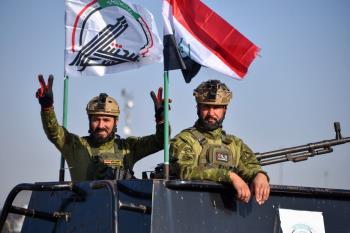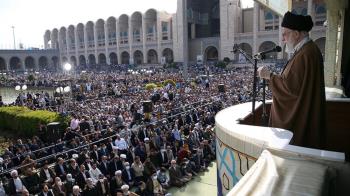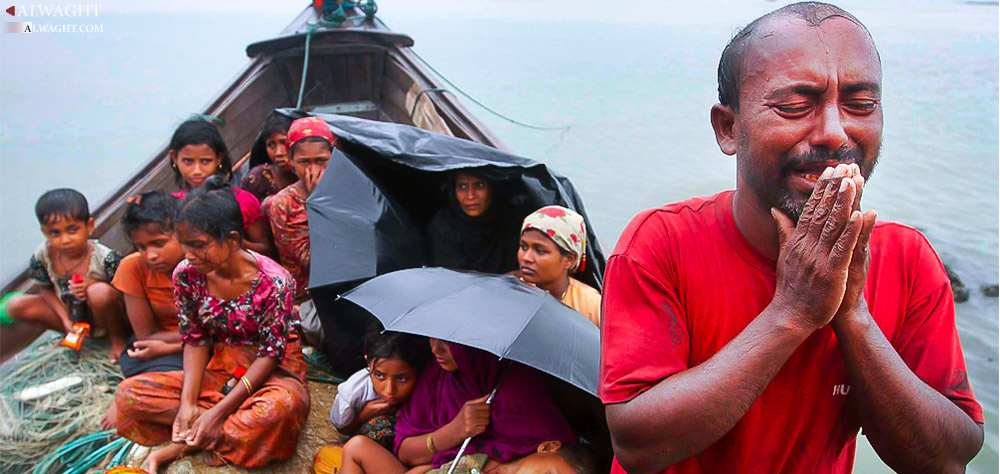Alwaght- The Muslims of Myanmar have been dubbed the world’s most persecuted minority in the world, and for good reason.
The Rohingya are an ethnic Muslim group in Southeast Asian nation. They make up only one million of the 50 million population. They mostly reside in Rakhine, one of the poorest states in the majority Buddhist country. Up to 140,000 Muslims are forced to live in camps which they are not allowed to leave without government permission. They are also denied citizenship, which basically makes them stateless, another one of their dubbings.
Refugees
They are also referred to as the “boat people.”
Being targets of violence, Rohingya have been trying to flee the country. However, even the waters have proven to be perilous for them.
The UNHCR estimates that over 110,000 people have boarded boats leaving Myanmar to neighboring countries such as Thailand, the Philippines, and Malaysia since 2012.
Between 2014 and 2015, the number of Rohingya refugees doubled to 25,000.
The land has not been much safer either.
After Rohingya refugees reach land, life in camps is not quite comfortable. Like in Myanmar, movement is limited.
“In refugee camps, the Rohingya women are victims of sexual violence, children are denied education and there is limited access to health and medical aid. The hostile environment for Rohingyas in Bangladesh urges the refugees in Bangladesh and Burma to seek help in other parts of Asia such as Malaysia, Thailand and Indonesia; however, these parts are not usually welcoming or like Bangladesh, do not have the resources to house another community,” according to the Restless Beings Project.
Rohingyas also suffer from malnourishment, isolation, illiteracy in already overpopulated Bangladesh.
For example, 90,000 refugees are crowded into one unregistered refugee camp in Bangladesh.
But what exactly drove them out?
In 2015, researchers released a report which revealed an increasing "ghettoization, sporadic massacres, and restrictions on movement" on Rohingya.
The report suggested that the Myanmar government was in the final stages of organizing a genocide against the Rohingya. By then, 1,100,000 Rohingya had been forced to seek refuge in displacement camps against the backdrop of the 2012 Rakhine State riots.
“To escape the systemic violence and persecution in Myanmar, an estimated 100,000 people have since fled the camps,” the Huffington post reported back then.
Human Rights Abuses
The persecution of the Rohingya comes in different forms. The Rohingya people are restricted in their movement, required to attain permission to marry from the NaSaKa or else face arrest, denied the right to work, denied education, and denied freedom to practice their religion and cultural customs.
In a letter dated May 4, 2016 to President U Htin Kyaw, Human Rights Watch stated that
“The effective denial of citizenship to the Rohingya has facilitated various human rights violations against them, including restrictions on the right to freedom of movement, discriminatory limitations on access to education, arbitrary detention, forced labour, and arbitrary taxation and confiscation of property.”
The rights group urged the “government to publicly call for an end to the public vilification and in some cases incitement to violence against Myanmar’s Muslim minority population.”
Violence against the Muslim minority are said to amount to ethnic cleansing.
In 2012, government troops destroyed mosques, carried mass arrests, and blocked aid to displaced Muslims. Later that year, Araknese mobs attacked “Muslim communities in nine townships, razing villages and killing residents while security forces stood aside or assisted the assailants. Some of the dead were buried in mass graves, further impeding accountability.”
Authorities failed to stop this aggression. In fact, public statements were promoting ethnic cleansing.
These acts of discrimination stem from the Rohingya’s differences. They are a minority ethnic group and that appears to be enough to be marginalized by the Buddhist majority state.
They have been living non-citizens in their homeland because of their darker skin, different features, language, faith and culture.
Help?
The humanitarian crisis that the Rohingya people are going through has exacerbated in recent years. Although the issue is not new, worsening conditions and attacks brought the Rohingya’s plight back to the spotlight.
Yet we don’t see world powers pressuring the government into alleviating these people’s pains or launching an operation to save the minority from the dangers facing them. Well, that’s probably because Western powers don’t see much potential in Myanmar, that is, their interests in the country, particularly helping out the Rohingya is not quite beneficial. While they usually capitalize on any call for so-called revolutions against a so-called dictatorship, Syria and Ukraine as examples, the plight of the Rohingyas couldn’t be more real or more neglected.
Getting help from the government is virtually impossible. In fact, it is responsible for much of these people’s suffering as its laws fall short of giving them basic human rights. They even support the groups that attack the Rohingya, rendering them accomplices in the crimes.
The country’s transition from a military-led government to an allegedly more democratic system played a major role in sparking the worsening violence against Muslims in 2010. The government has allowed the rise of the 969 movement, a bunch of Buddhist monks who employ “moral justification for a wave of anti-Muslim bloodshed,” Reuters reports.
Myanmar President Thein Sein’s office has referred to the anti-Rohingya movement as “just a symbol of peace.” While Aung San Suu Kyi, the Nobel Laureate who won the prize for fighting for “democracy”, has reprieved herself from the task of defending the oppressed.
So, that’s another closed door.
Neighbouring countries have either rejected them for economic and political reasons or have provided poor accommodation because they are already overpopulated and underfinanced. There is not much to expect there.
This leaves the rest of the world to extend a helping hand to the defenceless down-trodden Muslim minority group in Myanmar: the Rohingya.



























